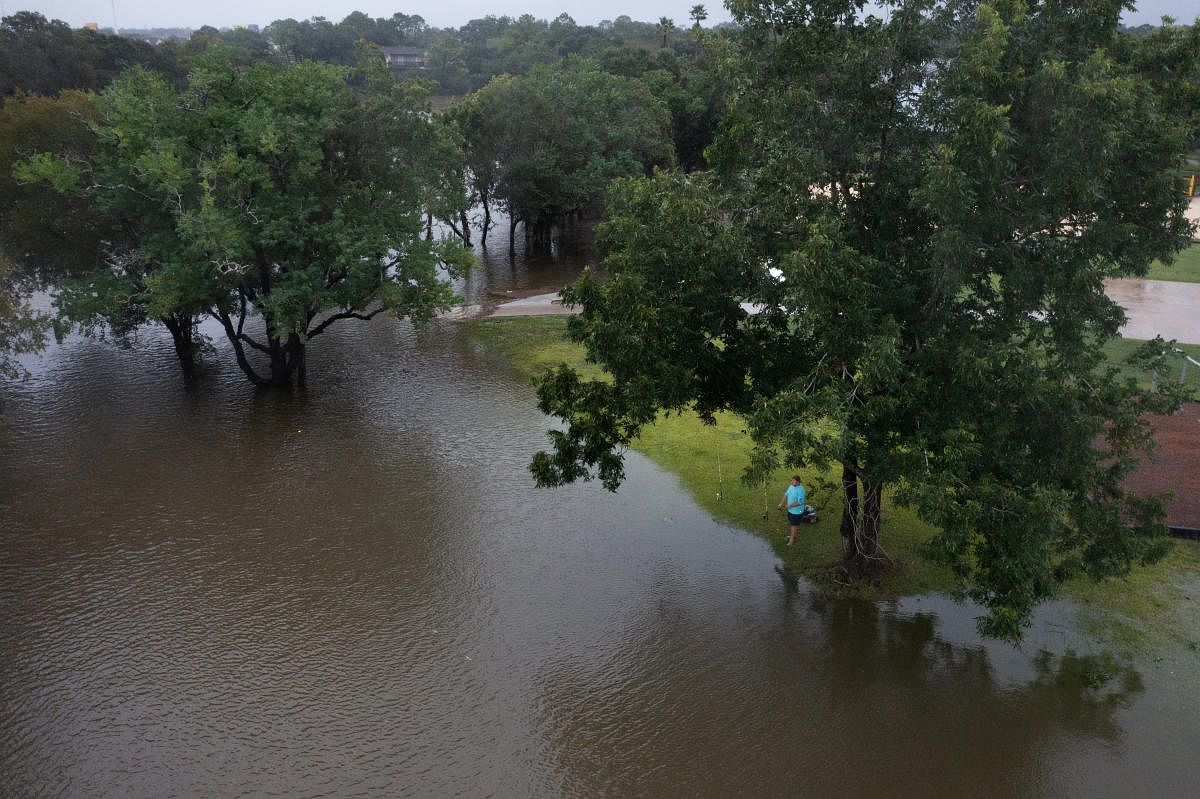
Heavy rains lashed Texas and Louisiana on Tuesday as Hurricane Nicholas weakened into a tropical storm, bringing the threat of widespread floods and power outages as it swept down the US Gulf Coast.
It is the second major storm to threaten the region in recent weeks after Hurricane Ida killed more than two dozen people in August and devastated communities in Louisiana near New Orleans.
Nicholas should weaken further and become a depression by Wednesday, the National Hurricane Center (NHC) said. It could still cause life-threatening flash floods across the Deep South in the next couple of days, the agency warned.
Nicholas was about 10 miles (15 km) southeast of Houston by 10 a.m. Central Time (1400 GMT), heading northeast with maximum sustained winds of 45 miles per hour (75 km per hour), the NHC said in a bulletin.
The storm was expected to drench the US Gulf Coast with torrential downpours as it moves slowly to the northeast throughout the day, and then turns eastward-moving over Louisiana, Mississippi and the Florida panhandle through Thursday.
President Joe Biden declared an emergency for Louisiana and ordered federal assistance for local responders because of the effects of Nicholas, the White House said.
Louisiana Governor John Bel Edwards warned against flash floods triggered by the heavy rain as drainage systems were still clogged with debris from Ida and other storms.
"It’s vital that we have as many resources as possible to respond to the forecasted heavy rainfall, potential for flash flooding & river flooding across Central & South Louisiana. I urge everyone to be prepared," he said on Twitter on Tuesday.
The storm was expected to drop an 5 to 10 inches of rain across the region and possibly 20 inches in isolated areas across southern Louisiana through Thursday, the National Weather Service said.
Nicholas could knock out electricity and hamper restoration efforts after Ida knocked out power in Louisiana.
Early on Tuesday, more than 92,000 customers in Louisiana and 530,000 in Texas had lost power, according to a Reuters tally, while in the Houston area alone, more than 454,000 customers faced outages, utility CenterPoint Energy said.
A CenterPoint official told local media that there was no restoration timeline set yet as crews were assessing power lines and isolating affected areas.
Texas Governor Greg Abbott declared states of emergency in 17 counties and three cities, with boat and helicopter rescue teams being deployed or put on standby.
Some 14 inches of rain fell in Galveston while Houston got almost six inches of rain overnight and into the morning, the National Weather Service reported.
In Houston, many residents, especially on the south and southeast sections of the city, awoke to power outages, downed trees and water in their homes on Tuesday after Nicholas passed over the area.
Houston Mayor Sylvester Turner said at a briefing that most emergency calls the city had received on Tuesday morning were related to issues involving emissions from emergency generators and not many related to high waters. He said there were no injuries or fatalities reported in Houston due to the storm.
Galveston Mayor Craig Brown told the Daily News that there was heavy street flooding in low-lying areas early Tuesday morning.
"What caught us a little by surprise was the speed of the winds," Brown said of the 55 mph winds that blew through his city of 50,000. "They were a little heavier with more force than we thought."
Galveston County spokesperson Tyler Drummond said officials were assessing the damage, but there was no reports of injuries.
"I suspect what we will find is a lot rooftop damage from sustained winds," he said. "It is all isolated. Some homes that had some tree limbs that fell in the yard or on the home."
In Clear Lake Shores, a community of 1,000 people some 25 miles north of Galveston, kayakers paddled along streets, surveying the damage to businesses, according to footage from KHOU TV in Houston.
Houston, the fourth most populous US city, was devastated in 2017 when Harvey, a Category 4 hurricane, slammed Texas, dropping up to 40 inches (102 cm) of rain in some areas and killing more than 100 people.
The Houston Independent School District along with dozens of schools districts across both states cancelled Tuesday classes.
The METRO in Houston resumed limited light rail and bus service on Tuesday. Hundreds of flights were cancelled or delayed at airports in Corpus Christi and Houston.
Although Hurricane Ida knocked off significant amount of refining capacity in the Gulf Coast earlier this month, Texas refineries remained operating as of early Tuesday.
Check out the latest DH videos here: